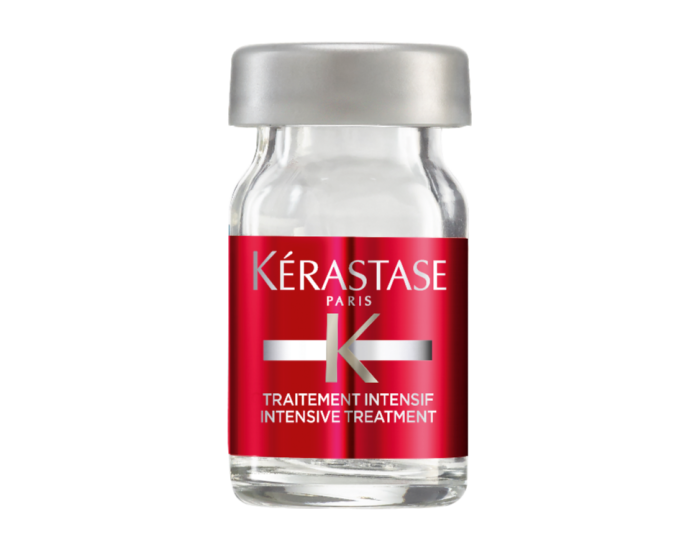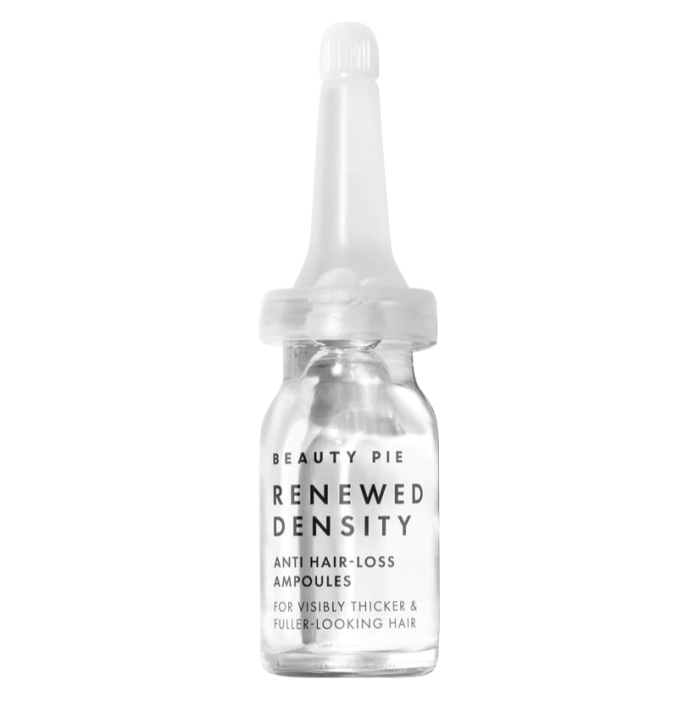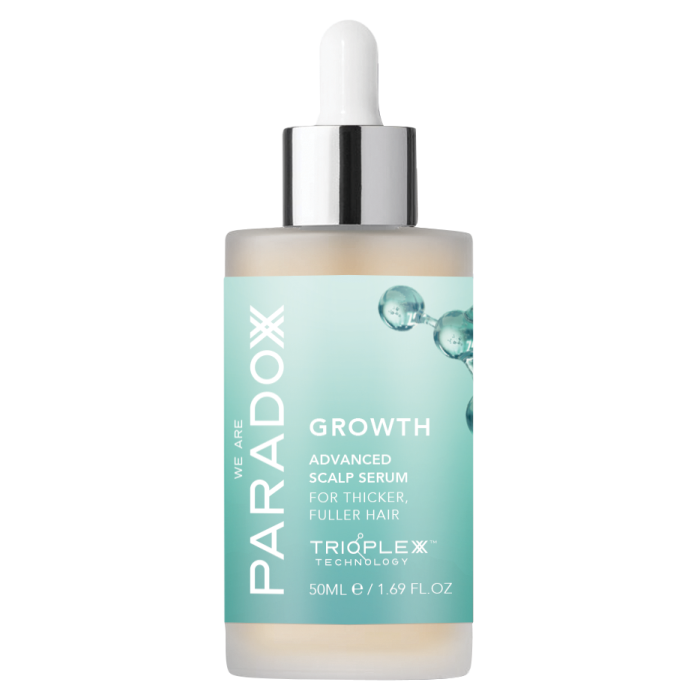Do the latest hair-loss treatments deliver?
Ouronyx looks more like a gallery than a beauty clinic. Italian stone covers the 8,500-square-foot interior, works by British artist Dominic Harris adorn the walls, and staffers with iPads guide clients into subterranean treatment rooms. Where better to tackle the hairy issue of female pattern baldness?
Although it is believed that 50 percent of women will experience hair loss at least once in their lifetime, treatments for thinning hair have historically focused on men. This is beginning to change as conversations about hormonal changes during puberty and menopause have broadened our understanding of the condition and, with it, increased treatment options for women. Key players include a number of biotechs: We Are Paradoxx is being touted for its Growth Advanced Scalp Serum — which, according to the results of an independent user study, can improve thickness by up to 75 percent and lead to growth of 47 cents more new ones Hair – while clean science brand The Nue Co has launched the Supa_Thick Topical Scalp Supplement. The latter claims to improve hair health by balancing the scalp’s microbiome.
The causes of hair loss are as varied as the treatment options. It could be female pattern hair loss, which is very often genetic; hormonal changes that occur before or after pregnancy; or skin conditions such as psoriasis. Styling choices can also be a factor: Dr. Sharon Wong, a dermatologist who specializes in hair loss, used to run a practice in Hackney and saw a lot of traction alopecia (caused by heat, braids, tissues, chemicals, and pulling at the root of the hair). ) with their Afro-Caribbean customers. If stopped early enough, traction alopecia can be reversed, but in more advanced cases, anti-inflammatory and topical medications might help.
“From an early age, my hair was exposed to myriad styles, from ‘protective’ ones like cornrows and braids — inherent in my culture — to curls and weaves, many of which resulted in injury to my scalp,” says Judy Koloko, one former fashion agent and black hair entrepreneur. “I had to completely rethink my hair care routine and focus on new ways to treat my scalp.” Her answer is The Steam Bar, a new beauty concept coming in 2023 that focuses on the care of Afro and textured hair. “Steaming has been and continues to be an essential part of this as it helps stimulate and nourish the scalp to support healthy hair growth.”
Seven hero hair products

Virtue Flourish Shampoo for Thinning Hair, £40 for 240ml

Kérastase Specifique Cure Anti-Chute Treatment, £52.50 for 10 applications

The Nue Co Supa_Thick Topical Scalp Supplement, £35 for 100ml

Beauty Pie Renewed Density Anti-Hair Loss Ampoules, £56 for 14

Philip Kingsley Density Preserving Scalp Drops, £45 for 85ml

Paradoxx Growth Advanced Scalp Serum, £30 for 50ml

Sisley Hair Rituel By Sisley Revitalizing Scalp Strengthening Serum, £160 for 60ml, allbeauty.com
Other hair loss developments range from medical procedures to non-invasive “tweaks,” the latest of which – autologous micrograft technology (AMT) – is now available from Ouronyx. The 45-minute treatment involves taking small skin grafts from the hairline, taking the stem cells from the follicles and reinjecting them into the scalp where the hair is thinning. AMT (£2,850 per session) may not stimulate growth where there is none, but it can thicken hair by up to 40 per cent. Ouronyx recommends a refresher treatment every 18 months.
The AMT offered by Ouronyx is just one option alongside fashionable but fancy procedures like PRP, the injectable delusion known as “the vampire treatment” in which the patient’s own platelets are injected into the scalp. “So much of my identity is related to my hair,” says Caroline, a venture capitalist in her early 50s. “It’s always been long and plentiful. When I went through menopause, I noticed that it was falling out. I began to see my scalp shimmering through my hair when in bright light and noticed my parting getting wider. At first I thought it was because I use too much product, hair dye and hot blow dryers and that my hair couldn’t handle it. I was devastated.” Caroline sought out AMT after finding that thickening shampoos and endless use of supplements made no visible difference. Six months after treatment, she sees a tremendous improvement: “It’s not twice as thick or so radical but it’s definitely back to it’s former state I’ll continue with the charges.”
Like Caroline, many women experience hair loss after menopause, where a drop in estrogen makes them vulnerable to androgens such as dihydrotestosterone (DHT), high levels of which can cause hair follicles to shrink. (DHT is also a major cause of hair loss in men; the difference is that women are more likely to become thinner than completely bald.) Makeup artist Violette Serrat, who says during pregnancy and after childbirth, it’s about 50 percent who has lost hair swears by Nutrafol hair supplements that focus on stress, hormones, metabolism, aging, diet and lifestyle.
dr Sharon Wong, who now has a clinic in London’s Harley Street, believes it’s possible to stop hair loss with prescription-strength applications of minoxidil, a topical drug that helps increase the size of hair follicles through blood circulation, and you too Can be bought at a lower strength over the counter in products like Rogaine. Wong recommends using it overnight—and remember, this is a treatment you need to use long-term. “Apply it directly to the scalp for at least six months before you see any benefit.” She also warns, “If you stop, you will lose the effects you would have gained.” She also prescribes spironolactone, an antiandrogen, Traditionally used to treat high blood pressure: “It helps counteract the testosterone in the hair follicles.” (Especially useful for women who experience hair loss during menopause.)
If you want your treatments to look and smell like beauty products, mainstream brands are also stepping in: Trichological shampoos from Philip Kingsley and Virtue both promise stronger, luscious curls, as do hair thickening treatments like Renewed Density Anti-Hair from Beauty Pie Loss Ampoules and Kérastase’s Specific Cure Anti-Chute Treatment. Those looking for a scalp-based treatment can try Sisley’s Revitalizing Fortifying Serum, which can be applied during a scalp massage.
Even with the online treatments out there, results can vary greatly. “It’s an incredibly emotional topic,” says Wong, who believes the psychological impact of hair loss in women is grossly underestimated. When only surgery can restore hair, Wong sends her clients to Dr. Greg Williams at London’s Farjo Hair Institute, which offers transplants for both men and women. “Hair loss marketing is much more geared towards men,” says Wong. “But a good hair transplant can be just as effective for women.”
There are also encouraging new studies of treating alopecia with the arthritis drug baricitinib. The hope is that treatments for hair loss – male or female – will become more manageable, effective and comparable to the type of “maintenance” care treatments performed in, say, a dermatologist’s office. “The conversation about hair loss should be open,” says Judy Koloko. “I’m not the only one who sees a need for premium products with quality ingredients backed by science to care for my crown.”